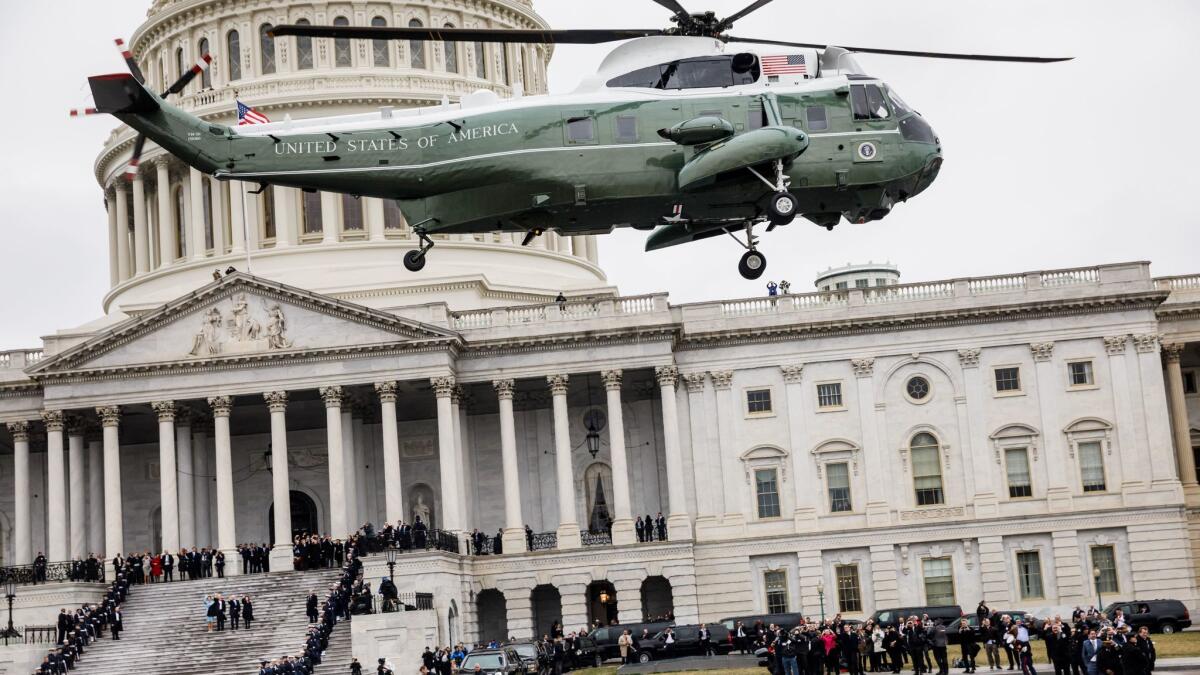Obama is ready for life after the White House. But first, he’ll retreat to Palm Springs

What is in store for Obama after the White House
Reporting from Washington — President Obama will begin the day Friday amid the pomp of Inauguration Day and end it in a way he hasn’t in eight years — without a coterie of aides, a slate of briefings or a trailing gaggle of reporters, as he hands over power and retreats to the quiet of the Palm Springs desert where former presidents before him have found escape.
After he witnesses the inauguration of President-elect Donald Trump at the U.S. Capitol at noon, Obama will take his final flight aboard the presidential aircraft — it will no longer be Air Force One, as the sitting president will not be aboard — and begin recuperating from a tumultuous campaign season and intense transition that punctuated his presidency. He will enter a period of what he says will be silence and reflection with family.
“I want to do some writing,” he told reporters this week. “I want to be quiet a little bit and not hear myself talk so darn much. I want to spend precious time with my girls.”
Inauguration Day live updates: ‘Now arrives the hour of action,’ Trump declares »

Presidents historically have cloistered themselves immediately after leaving office, letting their successors establish themselves as the new commander in chief. The Obamas are not disclosing how long they plan to remain in Palm Springs nor whether the former president and first lady will stay in the Coachella Valley longer than their daughters, one of whom is still in high school.
Obama isn’t the first former president to get away to the vicinity of the historic Sunnylands estate in Rancho Mirage, where he has taken several golf vacations and hosted foreign leaders over the past eight years; President Nixon retreated to Sunnylands after his resignation.
Obama has no plans to give interviews, the White House said, though he has said he will speak out as events demand it, particularly if the Trump administration moves to deport the 750,000 or so young adults who were brought into the U.S. illegally as children and whom Obama temporarily protected from deportation.
“The notion that we would just arbitrarily, or because of politics, punish those kids when they didn’t do anything wrong themselves, I think, would be something that would merit me speaking out,” Obama said.
Eventually, Obama will transition into his post-presidency career, which might be the most robust of any former president in the modern era. Obama has loosely outlined his plans for friends and close aides, several of whom will work with him either at his foundation, presidential library or personal office.
In the final days of his presidency, Obama talked about a return to the ideals of his early community organizing with the worldwide reach of a former president — as “global organizer,” as one friend called it.
Obama plans to help motivate a new generation of leaders at every level of government, though with a different approach as a global leader than the one he took as a grass-roots community organizer.
A close aide, David Simas, left the White House at the end of the year to become chief executive of the Obama Foundation, with a board of directors run by Obama’s close friend Marty Nesbitt. Part of the foundation’s responsibility is to build the Obama library on the South Side of Chicago, including programming, training, storytelling and interactive experiences.
Their first task is to raise money for the library and its museum. Officials haven’t disclosed a funding target, but the George W. Bush Presidential Library and endowment broke records with more than $500 million raised.
Obama may eventually enter into partnerships with the East-West Center, an education and research organization based in Honolulu, and with his alma mater, Columbia University in New York.
“He’s very optimistic about our future,” said Valerie Jarrett, a close family friend and longtime advisor.
Obama also hopes to keep up his regular contact with Trump, offering advice and counsel if he seeks it, or simply a word of empathy. Obama has often remarked on the change that set in when he was elected, the responsibility that appeared in the form of the decorated military officer who carries the nuclear launch codes who was never more than a few paces away.
Obama is not going to be the voice of opposition to Trump, aides agreed.
“President Obama is enormously grateful President Bush gave the president space to do his job when he took office, and he’ll do the same for President Trump,” said Deputy Press Secretary Eric Schultz. “President Obama won’t weigh in on the day-to-day churn of Washington, but if there’s something that’s counter to what he believes America stands for, he might consider speaking out.
“I’d expect a huge exhale after the 20th,” Schultz added.
Obama’s exact scope of influence is still taking shape, said one friend.
Right now, the friend said, Obama is contemplating “what this time means in the greater arc of history.”
Twitter: @cparsons
ALSO:
Transcript: Donald Trump’s inauguration speech
Some of Trump’s plans only sound new. Others are downright revolutionary
Protesters smash small number of storefronts in downtown Washington; police use pepper spray
More to Read
Get the L.A. Times Politics newsletter
Deeply reported insights into legislation, politics and policy from Sacramento, Washington and beyond. In your inbox three times per week.
You may occasionally receive promotional content from the Los Angeles Times.











